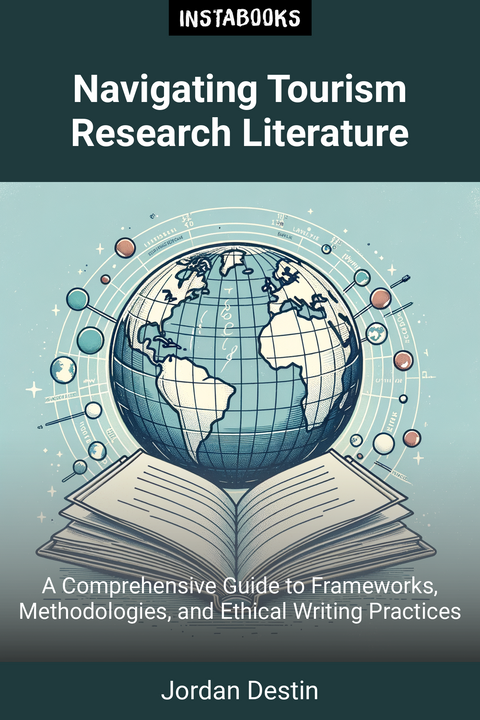
Navigating Tourism Research Literature
A Comprehensive Guide to Frameworks, Methodologies, and Ethical Writing Practices
Included:
✓ 200+ Page AI-Generated Book
✓ ePub eBook File — read on Kindle & Apple Books
✓ PDF Print File (Easy Printing)
✓ Word DOCX File (Easy Editing)
✓ Hi-Res Print-Ready Book Cover (No Logo Watermark)
✓ Full Commercial Use Rights — keep 100% of royalties
✓ Publish under your own Author Name
✓ Sell on Amazon KDP, IngramSpark, Lulu, Blurb & Gumroad to millions of readers worldwide
Introduction
Exploring the ever-evolving field of tourism research necessitates a robust understanding of the literature that shapes its foundation. "Navigating Tourism Research Literature" serves as an essential guide for students, researchers, and practitioners who seek to enhance their grasp of the scope, purpose, and relevance of literature reviews within tourism studies.
The Scope and Purpose
Understanding the scope of literature reviews can significantly impact research outcomes. This book delves into transformational tourism, sustainable development, and risk management, providing readers with a comprehensive overview of existing studies and identifying gaps that inspire future research. With an emphasis on critical evaluation, you will learn how a well-structured literature review can guide the development of a robust research agenda in tourism.
Sources and Databases
The literature review process relies heavily on accessible and reliable sources. This guide outlines key databases, such as Hospitality, Leisure, Sports and Tourism (HLST) and renowned academic search engines. By navigating these resources, readers can efficiently gather data and relevant articles to support their research endeavors in tourism.
Theoretical and Conceptual Frameworks
Explore the significance of theoretical and conceptual frameworks that underpin tourism research. Learn about the DIAMOND MODEL for sustainable tourism development and discover how these frameworks can organize literature and synthesize insights crucial for understanding complex tourism phenomena.
Quantitative and Qualitative Research Methodologies
This book offers an in-depth examination of both quantitative and qualitative methodologies in tourism research. Understand the nuances of quantitative studies targeting tourist behavior and experience, alongside qualitative approaches emphasizing personal transformation and emotional experiences. Readers will navigate through the ethics of research methodologies, ensuring adherence to rigorous academic standards.
Academic Writing Structures
The secret to a compelling literature review lies in its structure. This guide reveals the four critical stages of literature reviews—problem formulation, literature search, data evaluation, and analysis—and elaborates on ethical considerations necessary for maintaining integrity in academic writing.
Drafting and Publishing
Learn how to transition from drafting to publishing your literature review with confidence. Detailed strategies are provided for organizing and synthesizing research findings, leading to a polished manuscript ready for academic scrutiny.
By thoroughly investigating these critical components of tourism research literature, "Navigating Tourism Research Literature" equips readers with the necessary tools to conduct meaningful research, ultimately contributing to the development of the field. Based on comprehensive research and insights from experienced authors, this guide stands as a vital resource for all interested in tourism studies.
Table of Contents
1. Understanding the Review of Literature in Tourism Research- Scope and Purpose of Literature Review
- Identifying Key Research Areas
- Setting the Research Agenda
2. Gathering Sources and Databases
- Overview of Essential Databases
- Utilizing Search Engines for Research
- Evaluating Sources for Relevance
3. Exploring Theoretical Frameworks
- The Diamond Model for Sustainable Tourism
- Understanding Complex Tourism Phenomena
- Organizing Literature with Frameworks
4. Navigating Conceptual Frameworks
- Defining Conceptual Frameworks in Research
- Synthesis of Literature through Concepts
- Descriptive and Exploratory Research Methods
5. Quantitative Research Methodologies
- Understanding Quantitative Studies
- Analyzing Tourist Behavior and Experiences
- Limitations and Challenges in Measurements
6. Qualitative Research Methodologies
- Exploring Qualitative Approaches
- Capturing Emotional Changes in Tourism
- Researching Transformational Experiences
7. Structuring a Literature Review
- Stages of Literature Review Composition
- Problem Formulation Strategies
- Critical Evaluation of Reviewed Works
8. Ethical Considerations in Academic Writing
- Maintaining Transparency and Integrity
- Respecting Sources and Contributions
- Ethics in Drafting Literature Reviews
9. Drafting Techniques for Literature Reviews
- Synthesis of Information
- Organizing Your Manuscript
- Creating Summary and Synthesis Cohesion
10. Polishing and Publishing Your Review
- Finalizing Your Draft for Submission
- Ensuring Structure Meets Academic Standards
- Presentation in Academic Publishing
11. Future Directions in Tourism Research
- Emerging Trends in Research
- Sustainable Development Challenges
- Rethinking Tourism Experiential Research
12. Evaluating Literature Review Quality
- Criteria for Quality Assessment
- Feedback Mechanisms in Research
- Continuous Improvement in Research Practice
Target Audience
This book is written for students, researchers, and practitioners in tourism studies who seek to enhance their understanding of literature reviews and research methodologies.
Key Takeaways
- Gain insights into the scope and purpose of literature reviews in tourism research.
- Learn how to effectively gather and evaluate sources and databases.
- Understand the importance of theoretical and conceptual frameworks in organizing research.
- Dive into quantitative and qualitative research methodologies and their applications.
- Master the essential structure and ethics of academic writing.
- Acquire techniques for drafting, polishing, and publishing a literature review.
- Explore future directions and emerging trends in tourism research.
- Assess the quality of literature reviews and improve research practices.
